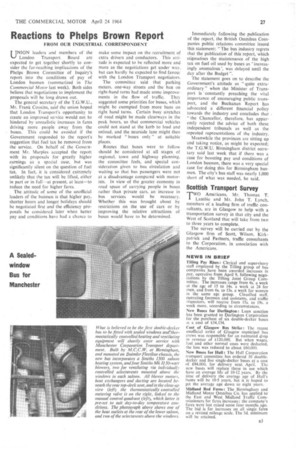Reactions to Phelps Brown Report
Page 29

If you've noticed an error in this article please click here to report it so we can fix it.
FROM OUR INDUSTRIAL CORRESPONDENT
UNION leaders and members of the London Transport Board are expected to get together shortly to consider the far-reaching implicaEions of the Phelps Brown Committee of Inquiry's report into the conditions of pay of London busmen (summarized in The Commercial Motor last week). Both sides believe that negotiations to implement the proposals will be long drawn out.
The general secretary of the T.G.W.U., Mr. Frank Cousins, said the union hoped that London Transport's opportunity to create an improved service would not be hindered by unrealistic increases in fares driving more people away from the buses. This could be avoided if the Government responded to the report's suggestion that fuel tax be removed from the service. On behalf of the Government Mr. Marples accepted the report with its proposals for greatly higher earnings as a special case, but was significantly silent on the question of fuel tax. In fact, it is considered extremely unlikely that the tax will be lifted, either in part or in full—at present, at least—to reduce the need for higher fares.
The attitude of some of the unofficial leaders of the busmen is that higher pay, shorter hours and longer holidays should be negotiated first and the efficiency proposals be considered later when better pay and conditions have had a chance to
make some impact on the-recruitment of extra drivers and conductors. This attitude is expected to be reflected more and more as the negotiations get under way, but can hardly be expected to find favour with the London Transport negotiators.
The committee said that parking meters, one-way streets and the ban on right-hand turns had made some improvements in the flow of traffic. They suggested some priorities for buses, which might be exempted from more bans on right hand turns. Certain busy stretches of road might be made clearways in the peak hours, so that commercial vehicles could not stand at the kerb to load and unload, and the nearside lane might then be marked "buses only" at suitable places.
Routes that buses were to follow should be considered at all stages of regional, town and highway planning, the committee feels, and special consideration given to bus circulation and waiting so that bus passengers were not at a disadvantage compared with motorists. In view of the greater economy in road space of carrying people in buses rather than private cars, an increase in bus services would be necessary. Whether this was brought about by restrictions on the use of cars or by improving the relative attractions of buses would have to be determined.
What is believed to be the first double-decker bas to be fitted with sealed windows am:1%ermostatically controlled heating and ventilating equipment will shortly enter service with Manchester Corporation Transport department. Built by 11/1.C.C.W. at Birmingham, and mounted on Daimler Fleetline chassis, the new bus incorporates a Smiths 1500 saloon heating system., and four Smiths Mk 1150-watt blowers, two for ventilating via individually controlled selectavents mounted above the windows in each saloon. All blower motors, heat exchangers and ducting are located beneath the rear top-deck seat, and in the close-up view (left) the thermostatically controlled metering valve is on the right, linked to the manual control quadrant (left), which latter is pre-set to suit day-to-day temperature conditions. The photograph above shows one of the heat outlets at the rear of the lower saloon, and two of the selectavents above the windows.
Immediately following the publication of the report, the British Omnibus Companies public relations committee issued this statement: " The bus industry regrets that the publication of this report, which stigmatises the maintenance of the high tax on fuel oil used by buses as 'increasingly anomalous', was delayed until the day after the Budget ".
The statement goes on to describe the Government's attitude as "quite extraordinary" when the Minister of Transport is • constantly preaching the vital importance of encouraging public transport, and the Buchanan Report has advocated a different financial policy towards the industry and concludes that 'the Chancellor, therefore, has apparently rejected the advice of both these independent tribunals as well as the repeated representations of the industry.
Meanwhile the provinces are sitting up and taking notice, as might be expected; the T.G.W.U. Birmingham district secretary said last week that if there was a case for boosting pay and conditions of London busmen, there was a very special cast for doing this for Birmingham busmen. The city's bus staff was nearly 1,000 short of what was needed, he said.




















































































































